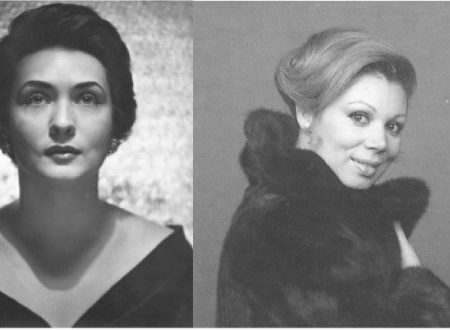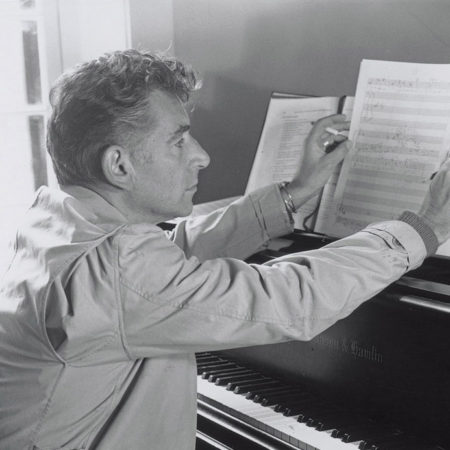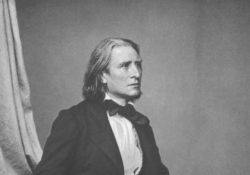By Individual Song
Sonetto 5 (Petrarch)
Sonetto 90 (Petrarch)
Sonetto 267 (Petrarch)
Sonetto 286 (Petrarch)
Sonetto 292 (Petrarch)
Related Websites
Song of America Profile
Visit William Bolcom's profile, and check out his catalogue of songs, on the Song of America website!
Visit siteWilliam Bolcom's Official Website
Check out more about William Bolcom on his official website!
Visit siteI. Sonetto 5
I. Sonetto 5
Music: William Bolcom (b. 1938)
Text: Petrarch (1304-1374)
This poem plays on the syllables of Laura’s name, in a Latinized version, Laureta, of the French Laureate.
Quando io movo I sospiri a chiamar voi
e ‘l nome che nel cor mi scisse Amore
LAU-dando s’incomincia udir di fore
il suon de’primi dolci accenti suoi;
vostro stato RE-al che ‘ncontro poi
raddoppia a l’alta impresa il mio valore
ma “TA-ci,” grida il fin, “ché farle onore
è d’alti omeri soma che da ‘tuoi.”
Così LAU-dare et RE-verire insegna
la voce stessa, pur ch’altri vi chiami,
o d’ogni reverenza et d’onor degna;
se non che forse Apollo si disdegna
ch’a parlar de’ suoi sempre verdi rami
lingua mor-TA–l presuntuosa vegna.
e ‘l nome che nel cor mi scisse Amore
LAU-dando s’incomincia udir di fore
il suon de’primi dolci accenti suoi;
vostro stato RE-al che ‘ncontro poi
raddoppia a l’alta impresa il mio valore
ma “TA-ci,” grida il fin, “ché farle onore
è d’alti omeri soma che da ‘tuoi.”
Così LAU-dare et RE-verire insegna
la voce stessa, pur ch’altri vi chiami,
o d’ogni reverenza et d’onor degna;
se non che forse Apollo si disdegna
ch’a parlar de’ suoi sempre verdi rami
lingua mor-TA–l presuntuosa vegna.
When I move my sighs to call you
and the name that Love wrote on my heart,
the sound of its first sweet accents
is heard without in LAU-ds.
Your RE-gal state, which I meet next,
redoubles my strength for the high enterpreise;
but “TA-lk no more!” cries the ending, “for to do
her honor is a burden for other shoulders than yours.”
Thus the word itself teaches LAU-d and RE-verence,
whenever anyone calls you, O Lady
worthy of all reverence and honor;
except perhaps Apollo is incensed that any
mor-TA-l tongue should come presumptuous
to speak of his eternally green boughs.
and the name that Love wrote on my heart,
the sound of its first sweet accents
is heard without in LAU-ds.
Your RE-gal state, which I meet next,
redoubles my strength for the high enterpreise;
but “TA-lk no more!” cries the ending, “for to do
her honor is a burden for other shoulders than yours.”
Thus the word itself teaches LAU-d and RE-verence,
whenever anyone calls you, O Lady
worthy of all reverence and honor;
except perhaps Apollo is incensed that any
mor-TA-l tongue should come presumptuous
to speak of his eternally green boughs.
II. Sonetto 90
II. Sonetto 90
Music: William Bolcom (b. 1938)
Text: Petrarch (1304-1374)
This poem draws on the description of Venus in Virgil’s Aeneid.
Erano I capei d’oro a l’aura sparsi
che ‘n mille dolci nodi gli avolgea,
e’l vago lume oltra misura ardea
di quei begli occhi, ch’ or ne son sì scarsi;
e ‘lviso si pietosi color farsi
(non so se vero o falso) mi parea:
i’ che l’esca amorsa al petto avea,
qual meraviaglia se di subito arsi?
Non era l’andar suo cosa mortale
ma d’angelica forma, et le parole
sonavan altro che pur voce umana:
uno spirto celeste, un vivo sole
fu quel ch’ i’vidi, et se non fosse or tale,
piaga per allentar d’arco non sana.
che ‘n mille dolci nodi gli avolgea,
e’l vago lume oltra misura ardea
di quei begli occhi, ch’ or ne son sì scarsi;
e ‘lviso si pietosi color farsi
(non so se vero o falso) mi parea:
i’ che l’esca amorsa al petto avea,
qual meraviaglia se di subito arsi?
Non era l’andar suo cosa mortale
ma d’angelica forma, et le parole
sonavan altro che pur voce umana:
uno spirto celeste, un vivo sole
fu quel ch’ i’vidi, et se non fosse or tale,
piaga per allentar d’arco non sana.
Her golden hair was loosed to the breeze,
which turned it in a thousand sweet knots,
and the lovely light burned without measure
in her eyes, which are now so stingy of it;
and it seemed to me (I know not whether
truly or falsely) her face took on the color of pity:
I, who had the tinder of love in my breast,
what wonder is it if I suddenly caught fire?
Her walk was not that of a mortal thing
but of some angelic form, and her word sounded
different from a merely human voice:
A celestial spirit, a living sun was what I saw,
and if she were not such now, a wound
is not healed by the loosening of the bow.
which turned it in a thousand sweet knots,
and the lovely light burned without measure
in her eyes, which are now so stingy of it;
and it seemed to me (I know not whether
truly or falsely) her face took on the color of pity:
I, who had the tinder of love in my breast,
what wonder is it if I suddenly caught fire?
Her walk was not that of a mortal thing
but of some angelic form, and her word sounded
different from a merely human voice:
A celestial spirit, a living sun was what I saw,
and if she were not such now, a wound
is not healed by the loosening of the bow.
III. Sonetto 267
III. Sonetto 267
Music: William Bolcom (b. 1938)
Text: Petrarch (1304-1374)
According to Petrarch, Laura died in Avignon in 1348.
Oimè il bel viso, oimè il soave sguardo,
oimè il leggiadro portamento altero!
Oimè il parlar ch’ogni aspro ingegno et fero
facevi umile ed agni uom vil, gagliardo!
Et oimè il dolce riso ondo uscio ‘l dardo
di che morte, altro bene omai non spero!
Alma real dignissima d’impero
se non fossi fra non scesa sì tardo:
per voi conven ch’ io arda e ‘n voi respiro,
ch’ i’pur fui vostro; et se di voi son privo
via men d’ogni sventura altra mi dole;
di speranza m’empieste et di desire
quand’ io parti’ dal sommo piacer vivo,
ma ‘l vento ne portava le parole.
oimè il leggiadro portamento altero!
Oimè il parlar ch’ogni aspro ingegno et fero
facevi umile ed agni uom vil, gagliardo!
Et oimè il dolce riso ondo uscio ‘l dardo
di che morte, altro bene omai non spero!
Alma real dignissima d’impero
se non fossi fra non scesa sì tardo:
per voi conven ch’ io arda e ‘n voi respiro,
ch’ i’pur fui vostro; et se di voi son privo
via men d’ogni sventura altra mi dole;
di speranza m’empieste et di desire
quand’ io parti’ dal sommo piacer vivo,
ma ‘l vento ne portava le parole.
Alas the lovely face, alas the gentle glance,
alas the proud, carefree bearing!
Alas the speech that made every harsh or
savage mind humble and every base man valiant!
And alas the sweet smile whence came forth the dart
from which now I expert death, no other good!
Regal soul, worthy of empire
if you had not come down among us so late:
for you I must burn, in you breathe,
for I have been only yours; and if I am deprived of you,
it pains me more than any other misfortune;
with hope you filled me and with desire,
when I left still alive that highest pleasure,
but the wind carried off the words.
alas the proud, carefree bearing!
Alas the speech that made every harsh or
savage mind humble and every base man valiant!
And alas the sweet smile whence came forth the dart
from which now I expert death, no other good!
Regal soul, worthy of empire
if you had not come down among us so late:
for you I must burn, in you breathe,
for I have been only yours; and if I am deprived of you,
it pains me more than any other misfortune;
with hope you filled me and with desire,
when I left still alive that highest pleasure,
but the wind carried off the words.
IV. Sonetto 286
Se quell’aura soave de’sospiri
ch’i’ odo di colei che qui fu mia
donna (or è in Cielo et ancor par qui sia
et viva et senta et vada et ami et spiri)
ritrar potessi, or che caldi desiri
movrei parlando, sì gelosa et pia
torna ov’ io son, temendo non fra via
mi stanchi o ‘ndietro a do man manca giri.
Ir dritto alto m’insegna, et io, che ‘ntendo
le sue caste lusinghe e i giusti preghi
col dolce mormorar pietoso et basso,
secondo lei conven mi regga et pieghi,
per la dolcezza che del suo dir prendo,
ch’ avria vertù di far piangere un sasso.
ch’i’ odo di colei che qui fu mia
donna (or è in Cielo et ancor par qui sia
et viva et senta et vada et ami et spiri)
ritrar potessi, or che caldi desiri
movrei parlando, sì gelosa et pia
torna ov’ io son, temendo non fra via
mi stanchi o ‘ndietro a do man manca giri.
Ir dritto alto m’insegna, et io, che ‘ntendo
le sue caste lusinghe e i giusti preghi
col dolce mormorar pietoso et basso,
secondo lei conven mi regga et pieghi,
per la dolcezza che del suo dir prendo,
ch’ avria vertù di far piangere un sasso.
If I could portray the gentle breath of the sighs
that I hear from her who here was my lady
(now she is in Heaven but seems to be here
and to live and feel and walk and love and breathe),
oh what hot desire would I move by speaking!
So assiduous and kind she returns where I am,
fearing lest I become weary along
the way or turn back or to the left.
She teaches me to go straight up, and I, who understand
her chaste allurements and her just prayers
with their sweet, low, pitying murmur,
I must rule and bend myself according to her
because of the sweetness I take from her word,
which would have the power to make a stone weep.
that I hear from her who here was my lady
(now she is in Heaven but seems to be here
and to live and feel and walk and love and breathe),
oh what hot desire would I move by speaking!
So assiduous and kind she returns where I am,
fearing lest I become weary along
the way or turn back or to the left.
She teaches me to go straight up, and I, who understand
her chaste allurements and her just prayers
with their sweet, low, pitying murmur,
I must rule and bend myself according to her
because of the sweetness I take from her word,
which would have the power to make a stone weep.
V. Sonetto 292
Gli occhi di ch’ io parlai sì caldamente,
et le braccia et le mani e i piedi d ‘l viso
che m’avean sì da me stesso diviso
et fatto singular da l’altra gente,
le crespe chiome d’or puro lucente
e ‘l lampeggiar de l’angelico riso
che solean fare in terra un paradiso,
poca polvere son che nulla sente.
Et io pur vivo, onde mi doglio et sdegno,
rimaso senza ‘l lume ch’ amai tanto
in gran fortuna e’n disarmato legno.
Or sia qui fine al mio amoroso canto;
secca è la vena de l’usato ingegno,
et la cetera mia rivolta in pianto.
et le braccia et le mani e i piedi d ‘l viso
che m’avean sì da me stesso diviso
et fatto singular da l’altra gente,
le crespe chiome d’or puro lucente
e ‘l lampeggiar de l’angelico riso
che solean fare in terra un paradiso,
poca polvere son che nulla sente.
Et io pur vivo, onde mi doglio et sdegno,
rimaso senza ‘l lume ch’ amai tanto
in gran fortuna e’n disarmato legno.
Or sia qui fine al mio amoroso canto;
secca è la vena de l’usato ingegno,
et la cetera mia rivolta in pianto.
Those eyes of which I spoke so warmly,
and the arms and the hands and the feet and the face
that had so estranged me from myself
and isolated me from other people,
The curling locks of pure shining gold,
and the lightning of the angelic smile
that used to make a paradise on earth,
all are a bit of dust that feels nothing.
And I still live, at which I am sorrowful and angry,
left without the light I loved so,
in a great tempest and a dismasted ship.
Now here let there be an end of my song of love;
dry is the vein of my accustomed wit,
and my lyre is turned to weeping.
and the arms and the hands and the feet and the face
that had so estranged me from myself
and isolated me from other people,
The curling locks of pure shining gold,
and the lightning of the angelic smile
that used to make a paradise on earth,
all are a bit of dust that feels nothing.
And I still live, at which I am sorrowful and angry,
left without the light I loved so,
in a great tempest and a dismasted ship.
Now here let there be an end of my song of love;
dry is the vein of my accustomed wit,
and my lyre is turned to weeping.






